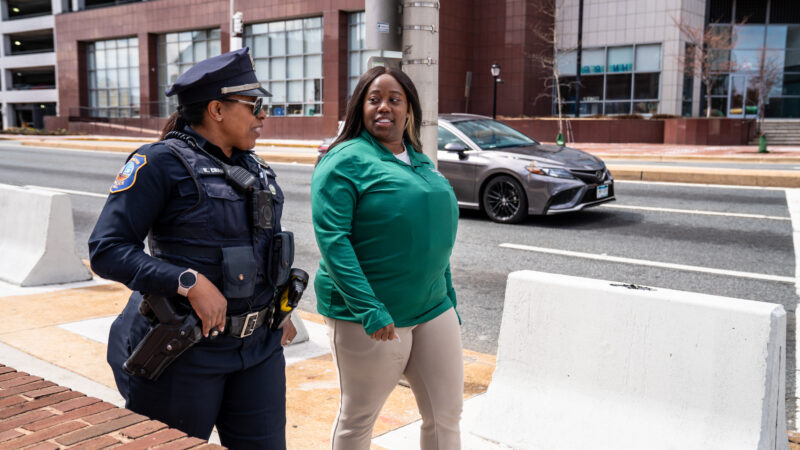The woman stood outside her front door and pointed at her car. That’s where the snakes were hiding, she told New Castle County Police Senior Cpl. Colleen Kearns and mental health case manager Tyler O’Bryant.
The woman had been calling 911 repeatedly for weeks, reporting snakes, alligators and other wildlife near her property. O’Bryant and Kearns, members of the police department’s Behavioral Health Unit, hoped the chance to talk face-to-face might help.
 To meet community members where they are with the help they need, ChristianaCare has developed impactful partnerships with police departments including the New Castle County Division of Police.
To meet community members where they are with the help they need, ChristianaCare has developed impactful partnerships with police departments including the New Castle County Division of Police.
After checking the interior of her car and reassuring her there were no snakes, O’Bryant turned the conversation to the woman’s health. She admitted she hadn’t been to the doctor – but she could consider going if she had help scheduling an appointment. O’Bryant handed the woman his business card and promised her a call the next day.
It’s not unusual for police to respond to 911 calls related to issues not directly tied to public safety. Nationally, an estimated 10% to 20% of these police calls involve an individual experiencing a crisis related to mental illness or substance use disorder.
To meet these neighbors where they are with the help they need, ChristianaCare has developed impactful partnerships with the New Castle County Division of Police, the Newark Police Department and the Wilmington Police Department.
ChristianaCare health care professionals like O’Bryant work in tandem with officers – and in some cases, respond together – with the shared goals of and helping people with behavioral health needs connect with care and reducing overuse of emergency resources.
“The whole idea is to create one moment – one window of time – where this person might be receptive to a message about seeking treatment. The willingness is the hardest part.” — Jim Bowes
“We can create a rapport with people by reaching out to them – and it helps because they will call me instead of 911,” said O’Bryant, who is part of ChristianaCare’s Community Health and Impact team.
“When you look at what community policing is supposed to be about, it’s establishing partnerships and finding other stakeholders in the community that have the same goals and objectives as you. The relationship with ChristianaCare does exactly that,” said Newark Police Lt. Greg D’Elia, whose department has an embedded case manager to assist with mental health calls.
 Bettina Tweardy Riveros, J.D.
Bettina Tweardy Riveros, J.D.
Bettina Tweardy Riveros, J.D., chief public affairs officer for ChristianaCare, said the shared mission of serving the community makes that possible.
“We are united by the same goals – to help people who are experiencing mental health and substance use issues, to increase access to treatment options and to use emergency resources wisely,” Riveros said.
“Our partnership with local police departments provides additional access to the important resources within our hospital system. It’s what serving with love and excellence is about.”
Partners in Care
“We get people who walk in here and they don’t have anywhere to go,” said Kwanza Timmons, a case manager with Wilmington Police Partners in Care who works to connect people with social services and other programs focused on housing and food insecurity. Neighbors can identify Partners in Care program staff by their bright green shirts.
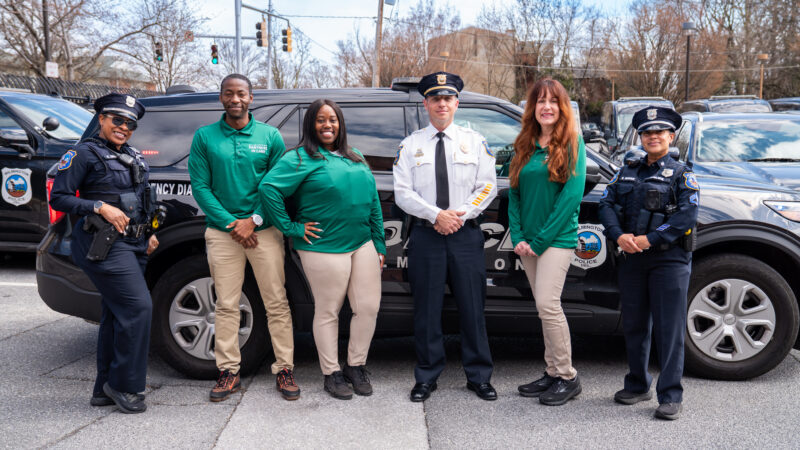 Partners in Care: Master Cpl. Kenita Champion, ChristianaCare case manager Kwanzaa Timmons, social worker Janae Robinson, Lt. Harold Boseman, social worker Janine Van Riper and Master Cpl. Brenda Merced.
Partners in Care: Master Cpl. Kenita Champion, ChristianaCare case manager Kwanzaa Timmons, social worker Janae Robinson, Lt. Harold Boseman, social worker Janine Van Riper and Master Cpl. Brenda Merced.
It can be challenging for police to address a person’s needs in crisis without the tools, training or time needed to navigate these situations, said Wilmington Police Lt. Harold Bozeman.
“You can’t solve homelessness and mental illness and addiction with handcuffs,” said Bozeman, who oversees the Partners in Care program.
By partnering with ChristianaCare, local police in Delaware are helping to reduce stigma around mental illness and increase community access to care, said Shelley Nix, manager of Community Benefit and Engagement in the Community Health Impact Department.
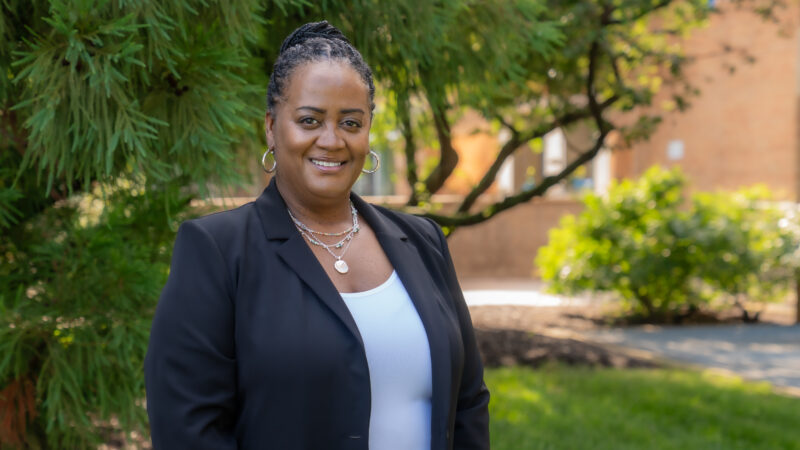 “We work really well together because each of us loves what we do – helping our community,” said Shelley Nix.
“We work really well together because each of us loves what we do – helping our community,” said Shelley Nix.
“The whole purpose of our program is to take the strain off the 911 grid and our patrol officers. We can do that because of the connections that we have with ChristianaCare,” said Senior Sgt. Erich Selhorst, supervisor of the New Castle County Police Behavioral Health Unit.
The teams get together monthly with Nix to discuss trends in policing and identify opportunities for collaboration. That connection is the thread that keeps these programs innovative, said Cpl. Kearns of New Castle County.
“We have the cooperation of a big, robust hospital system that can help us navigate through the challenges,” Nix said. “We work really well together because each of us loves what we do – helping our community.”
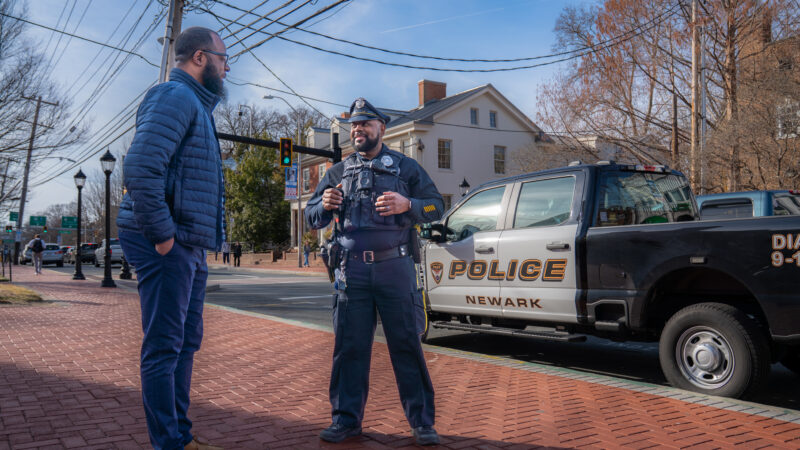 Mental health care manager Eric Harrington and Sgt. Darryl Saunders work together in the Newark Connect and Protect Program to address the root causes of problems while also reducing the frequency of repeat police calls and incidents.
Mental health care manager Eric Harrington and Sgt. Darryl Saunders work together in the Newark Connect and Protect Program to address the root causes of problems while also reducing the frequency of repeat police calls and incidents.
Success stories
Among the successes of these partnerships:
The three New Castle County Police Behavioral Health Unit co-responder teams and case managers worked with about 2,100 people in 2024. Half of them were diverted from arrest and instead referred into care.
Over 450 individuals have been helped since the Wilmington Police Partners in Care program began in March 2024.
Since launching the Newark Connect and Protect Program in December 2024, the Newark Police Department averages 30 referrals a month to connect people with resources including food delivery, mental health resources and adult in-home support.
At the heart of each of the hundreds of encounters are the individuals the partnerships help. A police officer responding to a call shared this turnaround experience:
“In March, I was able to connect a young lady with First State Community Action, which provides financial assistance with move-in costs for housing. Previously sleeping in her car, she was able to move into an apartment as a result of these resources,” he said.
He also connected her with ChristianaCare’s Health Options, which helps people obtain medical services including primary care.
Hero Help
Hero Help*
1,811 treatment encounters
419 mental health referrals
259 outreach encounters
256 Narcan kits distributed
17 diversions from incarceration
*Since inception in 2016
Trevor Vandegrift will never forget the words of the police officer who arrested him three years ago for carrying a controlled substance and breaking a no-contact order: “Dude, get your life together.”
The officer gave him a pamphlet for Hero Help, which provides outreach, access to treatment and education related to substance use disorders through Hero Help, the ChristianaCare and New Castle County Division of Police partnership. Although he didn’t consider himself addicted to drugs or alcohol, Vandegrift kept the pamphlet.
He still had it after spending a week in jail – and after a month of being homeless and facing the prospect of drug possession charges. Thinking about the advice the officer had given him, Vandegrift took another look at that pamphlet and made a call that he said changed his life.
“I’m not ashamed of where I’ve been because of where I am now, thanks to Hero Help.” — Taylor Vandegrift
With help from contacts he made through Hero Help, Vandegrift found a sober living facility with programs for substance use disorder. Hero Help staff checked in on him regularly, following up when they didn’t hear from him. They also helped him with upcoming court cases and with purchasing clothes for a new job.
“They just cared – and it felt like that was the first time anybody had looked out for me. They didn’t even know me,” said Vandegrift, who said the experience made him look at the impact of substance use disorder on his life.
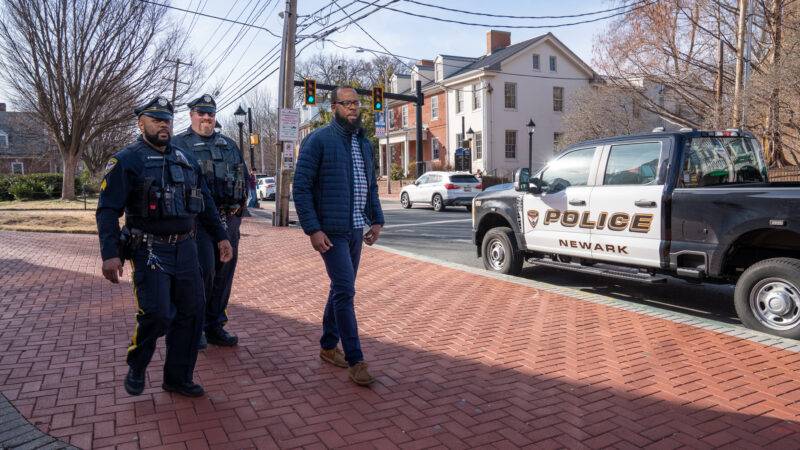 Newark police sergeants Darryl Saunders and Jay Conover join forces with Harrington to make an average of 30 referrals a month for connections to resources including food delivery, mental health resources and adult in-home support.
Newark police sergeants Darryl Saunders and Jay Conover join forces with Harrington to make an average of 30 referrals a month for connections to resources including food delivery, mental health resources and adult in-home support.
Jim Bowes, a ChristianaCare peer outreach coordinator for Hero Help, estimates that he speaks to more than 20 people each month who have suffered some kind of consequence related to substance use disorder, including overdose, hospitalization or arrest. Several take him up on his offer of treatment.
“Hero Help is the epitome of meeting people where they’re at,” said Bowes, who has been in recovery for over seven years.
“The whole idea is to create one moment – one window of time – where this person might be receptive to a message about seeking treatment. The willingness is the hardest part.”
Last year, Vandegrift, who has been sober for 2 ½ years, had the chance to speak with other police officers from around the country about the Hero Help program. Walking into the New Castle County Police headquarters for the event, he realized it was the first time he had ever gone inside voluntarily.
“To know that I’m not alone is major for me,” he said. “I’m not ashamed of where I’ve been because of where I am now, thanks to Hero Help.”
‘We’re here to help’
Although the police partnerships aim to keep people out of the criminal justice system by connecting them with health care, community resources and social services, there are times when arrests are necessary because of the circumstances or actions taken by the individual.
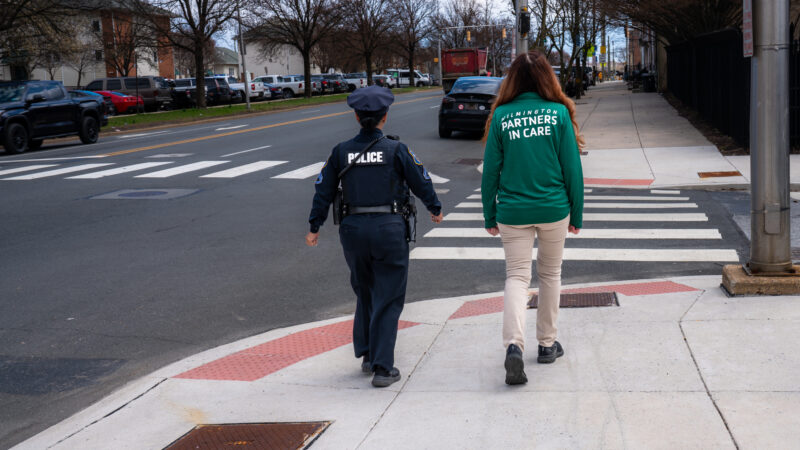 Teaming up in Wilmington: Merced and Van Riper. When they respond to calls, Merced said, “You can tell the way a person’s body changes when they see that green shirt – ‘OK, this is what I want.’ They’ll finally tell you, ‘I need help.’”
Teaming up in Wilmington: Merced and Van Riper. When they respond to calls, Merced said, “You can tell the way a person’s body changes when they see that green shirt – ‘OK, this is what I want.’ They’ll finally tell you, ‘I need help.’”
Even in those scenarios, the behavioral health teams play an important role in coordinating information for Mental Health Court, which works to identify and support people who are in the criminal justice system as a result of serious mental health issues, said Abolore Oshodi, J.D., a deputy attorney general in the Delaware Department of Justice.
“Early detection of the need for participation in Mental Health Court is crucial because the criminal justice process can sometimes be lengthy,” Oshodi said.
“So the fact that the behavioral health units sometimes refer these cases right after an arrest plays a big part in the overall goal of getting someone connected to the resources and treatment. We love the collaboration.”
There’s strength in working together. Wilmington Master Cpl. Brenda Merced quickly discovered that partnering with a Partners in Care clinician helps reduce the stress on both ends of a call.
“When I know the situation is safe, we respond together, and we always let them know, ‘We’re here to help.’ You can tell the way a person’s body changes when they see that green shirt – ‘OK, this is what I want.’ They’ll finally tell you, ‘I need help,’” Merced said.
“It feels good to hear them say that, like we did our job.”
